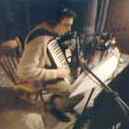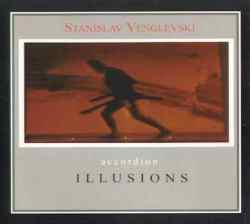The pieces (excepting Dark Eyes ) are original compositions
by Stas; a majority of them French waltzes. What Stas accomplishes with
this old genre is to inject freshness and enthusiasm into it. Usually when
we hear musette waltzes they're either recordings from a bygone era or
renditions by a performer looking through an accordion darkly. But on this
CD Stas is playing his own stuff and makes us feel it's new again and not
the ghosts of accordions past. Stas has a gift for melody and his
interplay with Mike Alongi orchestrates the music nicely.
My reference to the CDs "accordion sound" wasn't idle; this CD is
fisarmonica pura (maybe Italian will distinguish what I'm trying
to say). The sound is without any of the harshness, reverb or would-be
organ sonorities too often heard -- and the timbres and artistry goes
straight to your heart the way only an accordion can when it's sounding
its best and wedded to the music. The musette tonalities were so good that
anyone who suffers fear and loathing of detuning will have a road to
Damascus experience.
In the middle of the recording resides a nice Children's Suite - it comes
as a break, giving the CD a structure. Stas and Mike play the suite
beautifully -- the mimetic movements representing birds, elephants, mice,
cats, the circus, etc., emerge with humor, virtuosity and artistry. Stas'
suite is not (nor does it intend to be) a giant-killer in child's clothing
like we've heard from Semenyov, Schedrin, Solotajow and others. The suite
is a delightful essay that uses the accordion to charmingly create mimetic
miniatures. It's very enjoyable and I even thought of it as a weapon for
ripping a few electric guitars from young people's sticky imaginations.
At this point I may mention a problem - although on this CD it's less
intrusive. Stas is a precise and exciting player with few peers; however,
he tends to short-change notes. He does it so well that it's usually
thrilling. Interestingly, when you see him play in person he creates an
illusion of phrasing with his body. But a recording obviates kinesthetic
aids and one-way rubato can undermine a sense of emotional
depth. Such an impression would be unfortunate, because Stas has
tremendous emotional resources. On Accordion Illusions, I'm
glad to say his heartfelt qualities come across better than ever. I think
the presence of Mike Alongi restrained Stas' prestomania and
the restraint carried over into his solos; particularly Fond Recollections
(a moving tribute to his father) - a piece that shows a fine sense of
emotional phrasing. Fond Recollections is one of his best
solos.
Running through the selections: Lindy's Song opens the CD
with a bright, almost contrapuntal waltz that sets the tone of much that
follows in Stas' dip into the demimonde of musette. Lindy's Song is
dedicated to a deceased friend (Lindy Kao of Chicago), as is the next
piece, Always and Eternity. The theme of Always
is appropriately poignant, but I question the basso continuo
throughout the first half. I know a dirge-like effect was
intended, but the bass-chord 2/4 sustained notes seemed overstated. Later
in the piece the bass line is played on a higher register and there are
tempo changes. I wish such variations had appeared earlier. It's a
lovely theme.
Let's Play Together is a delightful waltz where the
performers romp along a neat melodic line and regularly tease it with a
dissonant chord. It's instantly memorable, like many of this CD's tunes.
Time and again Stas proves a fine melodist, which is an uncommon talent -
one that many would-be composers pretend they could tap if they wanted
(not true).
Latino Moment is a brief jazz bossa nova and
Stas displays (solo) a solid command of rhythmic phrasing and impeccable
timing. It's over too soon, but that only makes repeating it
inevitable.
Short Visit is subtitled, "Two friends getting together,
both eager to contribute to the conversation"; it's a waltz time dialectic
that's as fresh and satisfying as a warm baguette.
Ecstasy Tango is a viejo tango (pre-Piazzolla) opening with clipped rhythm and proceeding along traditional lines. It could easily take its place
with Rodriguez' La Cumparsita - no mean feat.
French Moment (solo) is a nice waltz and it's a good tune,
but it shows Stas coming very close to cutting notes too short. On the
positive side, his chromatic runs are clean, fast and thrilling; however,
after awhile too much seems sacrificed for fireworks. The piece is well
worth listening to repeatedly - but even at 2:18 there's nowhere to go and
redundancy peeks over the horizon. When technique isn't the handmaiden of
meaning we may be in an arena more athletic than aesthetic.
Midnight Waltz is a complete contrast to French
Moment, it's a slow, heartfelt and very ethnic Moldavan waltz with
the two accordions weaving a spell of simplicity and sincerity. The piece
almost sets a scene: it's late night in a peasant house on the Steppes
with everyone a bit drunk and thinking of lost love. Two peasants pull out
their instruments and fall into a fit of Slavic melancholy that will last
the whole night and make the simplest things profound.
Autumn Illusions is another fine waltz with the accordions
echoing each other and interweaving beautifully, the effect is almost
orchestral, like we're in Paris hearing Joseph and Tito Colombo or Bras
and Garrigoux and their orchestras, bringing off one of the album's
strongest entries in the genre.
Musette Caprice (solo) is capricious and demonstrates Stas'
technical prowess with runs and trills, but here I feel he's constantly
threatening to overrun expression -- even the trio seems rushed. I enjoyed
it, I admired the technique, but I thought Stas should reconsider.
Coming again to Fond Recollections it's clear what an
emotional impact Stas can deliver when he interiorizes the music and
shapes his phrasing with feeling. Perhaps when Stas has a story to tell he
finds his deeper self. I can appreciate that his abundant technical skill can
be a siren call, but it mustn't become a trap. In light of that, it was
wise of Stas to play with Mike Alongi, a hugely talented player who in
many ways centers him. Mike functions like the exquisite quartet did on
the STAS! CD and adds his own deeply felt artistry.
Stas is an exciting player and someone who has shown himself with this CD
to be a fine composer. I liked all of his compositions, finding them
melodic and memorable. I liked, too, that this was a pure accordion CD;
that is, no other instrument could assay these pieces as well -- no violin,
no cello, no piano - Itzhak, Yo Yo, Vladimir, nope, nope, nope. I often
thought as I listened to his compositions that Stas could be a nascent
Andre Astier (a great composer who Peter Soave terms the Chopin of the
accordion). I liked the promise of that thought. It's a relief to hear
music dedicated to the instrument on which it's played and that that
instrument is an accordion. Free-reed enthusiasts are too often forced to
do aesthetic somersaults -- of loving the accordion and suppressing
thoughts like, "This would be better on an organ or violin." Accordion
Illusions is music that no one on any other instrument could usurp.
Usually, this kind of aesthetic relief only occurs when interlopers play
Piazzolla, "Yo! Yo Yo, you did good, but a cello does not a bandoneon do,
the shoe's on the other ear."
Well, do your other ear a favor and buy Stas' CD and let fisarmonica
pura waltz over you knowing that Itzhak on a good day couldn't
move you half as well. Minor point: I liked the design of the case a lot;
I only wish it had a velcro tab to keep it closed.
 I like this new CD by Stas Venglevski a lot. First of all,
it's beautifully recorded with an accurate accordion sound. The interplay
between the two musicians is happy and heartfelt and at times they mesh
like a single player with four hands. Mike Alongi is brilliant and a
perfect partner for Stas.
I like this new CD by Stas Venglevski a lot. First of all,
it's beautifully recorded with an accurate accordion sound. The interplay
between the two musicians is happy and heartfelt and at times they mesh
like a single player with four hands. Mike Alongi is brilliant and a
perfect partner for Stas.  The only piece that isn't an original is Dark Eyes; here
Stas performs a series of his own variations. His individual takes are
excellent, but I thought a stronger overall form was needed, lest the
variations seem like gymnastics - that's an eight, there's a nine; bravo:
ten! W rthner's variations on the same tune pull the parts into a cohesive
experience, which I think is necessary unless the variants are only
harmonic cousins like Bach's Goldberg Variations. I felt
Stas just needs some rearrangement and overall dramatic development.
The only piece that isn't an original is Dark Eyes; here
Stas performs a series of his own variations. His individual takes are
excellent, but I thought a stronger overall form was needed, lest the
variations seem like gymnastics - that's an eight, there's a nine; bravo:
ten! W rthner's variations on the same tune pull the parts into a cohesive
experience, which I think is necessary unless the variants are only
harmonic cousins like Bach's Goldberg Variations. I felt
Stas just needs some rearrangement and overall dramatic development.
